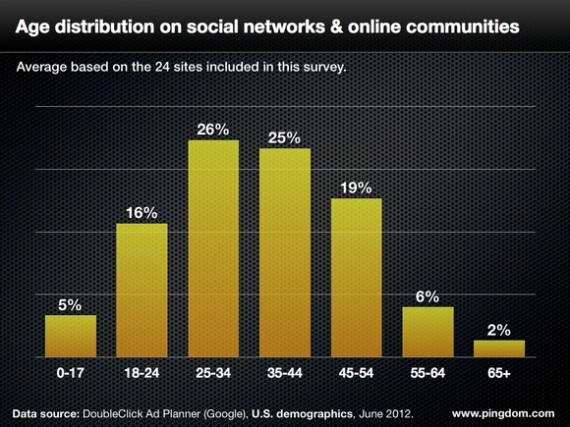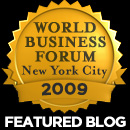 Hardly a day goes by without me hearing a senior executive at some major company cite the growing influence of the upcoming “Millennial Generation” as the reason for their foray into the enterprise social world.
Hardly a day goes by without me hearing a senior executive at some major company cite the growing influence of the upcoming “Millennial Generation” as the reason for their foray into the enterprise social world.
But I wonder if they’re missing a trick here – look at almost any study of who actually uses Social Media in the modern world – and you’ll see that the major users are not those born in 2000+ (who are yet to get into the workforce) – but rather you see an almost even split between those in the 25-34 age and those in the 35-44 range.
Compare that then with the average working age for most industries at late 30s-early 40s, and suddenly you come to the realization that most companies must have somewhere between 25-50% of their EXISTING workforce is already actively involved in the social world – and not just active in it – but actively leading it. It’s almost like we’ve missed out on an entire “social generation” that is/should be the real driver of social technologies in the enterprise.
 Although there are plenty of reasons I can think of why Millennials and their ilk don’t use social to the same extent as older generations (age and access come to mind) – the rise of Social Media in our personal lives – driven by our desire to communicate with, interact with and influence our friends, relatives, and to gain access to information which has become available at an unprecedented level – has driven the familiarity and adoption of Social Media way ahead of the expected Millennial boom.
Although there are plenty of reasons I can think of why Millennials and their ilk don’t use social to the same extent as older generations (age and access come to mind) – the rise of Social Media in our personal lives – driven by our desire to communicate with, interact with and influence our friends, relatives, and to gain access to information which has become available at an unprecedented level – has driven the familiarity and adoption of Social Media way ahead of the expected Millennial boom.
Some organizations already get this of course – I was recently talking to the CEO of a large retailer who shared by vision that social technologies are no longer a nice to have – but rather a must have for the modern enterprise.
We live in a strange period in time where for the first time in history, our personal technology use and sophistication actually outstrips that which we have available at the workplace.
Your top employees go home and are afforded the ability to influence the world around them through online social tools like Facebook and LinkedIn – they can not only share information, find out what others are doing, work together virtually to achieve important personal projects (birthday parties, group travel, weddings, and more) and to rationalize and support the important decisions and purchases in their lives.
So isn’t it weird that we then employ these “personally powerful” people into our organizations and then don’t give them the tools to work as effectively as they can at home?
 Indeed, many organizations see the demand and desire from employees for social technologies and processes in the workplace to outrank the “traditional” fringe benefits that have been the focus of Silicon Valley HR orgs since the early 2000s – pool and ping pong tables and “chill out rooms” are making way for flexible working and the ability to feel deeply engaged at a value-level via social tools to the work of their company. Social technologies in reality are no longer a nice to have, but are very much a must have!
Indeed, many organizations see the demand and desire from employees for social technologies and processes in the workplace to outrank the “traditional” fringe benefits that have been the focus of Silicon Valley HR orgs since the early 2000s – pool and ping pong tables and “chill out rooms” are making way for flexible working and the ability to feel deeply engaged at a value-level via social tools to the work of their company. Social technologies in reality are no longer a nice to have, but are very much a must have!
Of course – this means wide ranging organizational changes for most companies. The Social world thrives on standards of high levels of transparency, engagement, and accountability that most organizations aren’t currently prepared for. In my mind, making these necessary changes will undoubtedly present themselves as the Change Management Challenge for the decade in most enterprises.
Do you see these at your org? – let me know!













